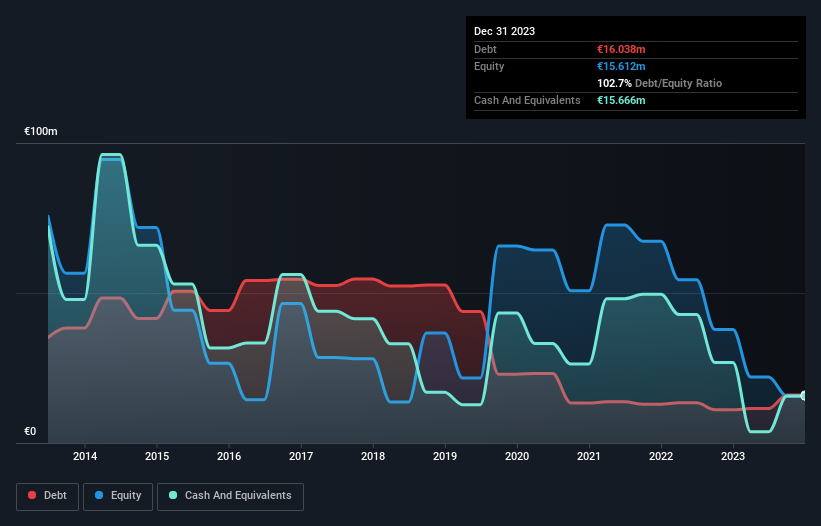Warren Buffett famously said, 'Volatility is far from synonymous with risk.' So it might be obvious that you need to consider debt, when you think about how risky any given stock is, because too much debt can sink a company. Importantly, Transgene SA (EPA:TNG) does carry debt. But the more important question is: how much risk is that debt creating?
When Is Debt Dangerous?
Debt assists a business until the business has trouble paying it off, either with new capital or with free cash flow. If things get really bad, the lenders can take control of the business. However, a more common (but still painful) scenario is that it has to raise new equity capital at a low price, thus permanently diluting shareholders. By replacing dilution, though, debt can be an extremely good tool for businesses that need capital to invest in growth at high rates of return. When we examine debt levels, we first consider both cash and debt levels, together.
See our latest analysis for Transgene
What Is Transgene's Debt?
As you can see below, at the end of December 2023, Transgene had €16.0m of debt, up from €11.1m a year ago. Click the image for more detail. However, because it has a cash reserve of €15.7m, its net debt is less, at about €372.0k.

How Strong Is Transgene's Balance Sheet?
Zooming in on the latest balance sheet data, we can see that Transgene had liabilities of €10.0m due within 12 months and liabilities of €19.6m due beyond that. Offsetting this, it had €15.7m in cash and €1.33m in receivables that were due within 12 months. So its liabilities outweigh the sum of its cash and (near-term) receivables by €12.6m.
Given Transgene has a market capitalization of €109.2m, it's hard to believe these liabilities pose much threat. But there are sufficient liabilities that we would certainly recommend shareholders continue to monitor the balance sheet, going forward. Carrying virtually no net debt, Transgene has a very light debt load indeed. The balance sheet is clearly the area to focus on when you are analysing debt. But ultimately the future profitability of the business will decide if Transgene can strengthen its balance sheet over time. So if you want to see what the professionals think, you might find this free report on analyst profit forecasts to be interesting.
In the last year Transgene had a loss before interest and tax, and actually shrunk its revenue by 24%, to €7.9m. To be frank that doesn't bode well.
Caveat Emptor
Not only did Transgene's revenue slip over the last twelve months, but it also produced negative earnings before interest and tax (EBIT). Its EBIT loss was a whopping €30m. Considering that alongside the liabilities mentioned above does not give us much confidence that company should be using so much debt. Quite frankly we think the balance sheet is far from match-fit, although it could be improved with time. However, it doesn't help that it burned through €37m of cash over the last year. So in short it's a really risky stock. There's no doubt that we learn most about debt from the balance sheet. However, not all investment risk resides within the balance sheet - far from it. Case in point: We've spotted 4 warning signs for Transgene you should be aware of, and 2 of them make us uncomfortable.
At the end of the day, it's often better to focus on companies that are free from net debt. You can access our special list of such companies (all with a track record of profit growth). It's free.
Valuation is complex, but we're here to simplify it.
Discover if Transgene might be undervalued or overvalued with our detailed analysis, featuring fair value estimates, potential risks, dividends, insider trades, and its financial condition.
Access Free AnalysisHave feedback on this article? Concerned about the content? Get in touch with us directly. Alternatively, email editorial-team (at) simplywallst.com.
This article by Simply Wall St is general in nature. We provide commentary based on historical data and analyst forecasts only using an unbiased methodology and our articles are not intended to be financial advice. It does not constitute a recommendation to buy or sell any stock, and does not take account of your objectives, or your financial situation. We aim to bring you long-term focused analysis driven by fundamental data. Note that our analysis may not factor in the latest price-sensitive company announcements or qualitative material. Simply Wall St has no position in any stocks mentioned.
Have feedback on this article? Concerned about the content? Get in touch with us directly. Alternatively, email editorial-team@simplywallst.com
About ENXTPA:TNG
Transgene
A biotechnology company, designs and develops therapeutic vaccines and oncolytic viruses for the treatment of cancer in France.
Moderate risk with limited growth.
Market Insights
Community Narratives



